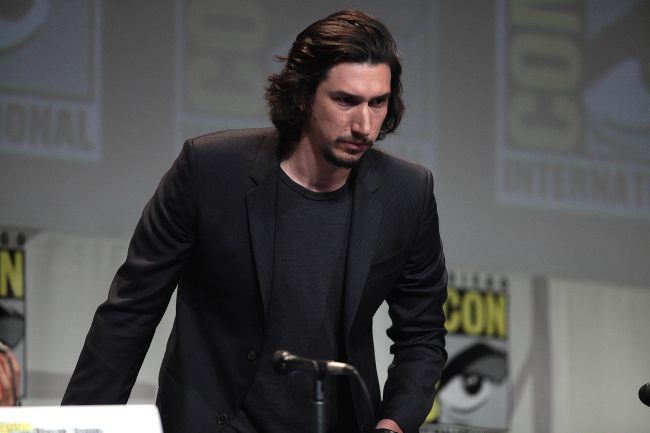The Emo Kylo Ren Twitter account (@KyloR3n) has had me ugly laughing since The Force Awakens came out. It’s true, Kylo Ren is in so many ways like an angsty teenager who probably listens to the galaxy far far away version of My Chemical Romance and wears one of those plastic Darth Vader watches under his robes.
He is the ultimate Vader fan boy, complete with scowling, lots of black clothing, and leftover adolescent rage. The tweets and memes making fun of Kylo Ren have been endless, and even the totally hilarious “Undercover Boss” SNL skit with Adam Driver plays on the fact that Kylo Ren is this insecure, angry boy.
Despite all this, I’m still a diehard Kylo Ren fan. I left an advanced screening of The Force Awakens being so relieved that they had crafted such an excellent villain—evil, sure, but complicated and conflicted, much like Vader was. And as much as the memes and jokes make me laugh, part of me thinks people are being a little too hard on Kylo Ren. Sure, he’s angst ridden, and a little bit “emo,” so to speak. But, let’s be real, with what Kylo Ren has been through, who wouldn’t be?
Kylo Ren’s mixed up family life
To us, Han, Leia, and Luke are the heroes who captured our imagination and saved the galaxy. To Kylo Ren, they’re his annoying parents and weird uncle. We may even discover in the coming films more tidbits about their flawed parenting. Now, imagine for a moment, you’re a child and you’re going through some changes—puberty, plus the Force—and your parents decide to send you to live with your dear hermit uncle and train in the ways of the Jedi, who, despite all the good they do, closely resemble a cult. Embracing the light side of the Force comes with some strict rules. It’s a rigid dogma, all about balance, and justice, and emotional detachment from worldly things that distract and corrupt people. Not exactly the summer camp you imagined.
Kylo Ren is young, powerful, confused, and craving freedom. Like so many young people do, he idolizes a dead family member. There’s something pure and intact about admiring the legacy of a family member that is long gone. It stands out to you and in the eyes of a child, it appears to exist without flaws. Kylo Ren perceives his grandfather, Darth Vader, not just as a person, but as a legend, because it’s easy to perceive the dead as such and to glorify who they were. It’s why so many of us are captivated by the stories of our ancestors, but less interested in the stories of our living parents—the people in front of you exist with their flaws, the people who you never knew, who exist only as a preserved memory, are the ghosts that fascinate us.
Combine all of this with the fact that he is craving independence and freedom—which teen doesn’t fantasize at some point about leaving home and going somewhere incredible?
dear diary
i got my permit!
to celebrate we had the macaroni and cheese that is shaped like darth vader helmets
today was almost all right— Emo Kylo Ren (@KyloR3n) February 27, 2016
Kylo Ren’s journey into darkness
Enter Supreme Leader Snoke. He’s older, smarter, and more powerful. And he manipulates a young person in the midst of astounding changes—think puberty, plus the Force, plus being related to the legendary Jedis. He promises Kylo Ren emancipation, a release from the rigid rules of the light side, a chance to continue his grandfather’s legacy, and ultimately, a big opportunity to stick it to his parents. It’s not the first time in the Star Wars universe that an older, much more powerful person manipulates a young person when they are most vulnerable. The unequal power dynamics that existed in the relationship between Darth Sidious and Darth Vader also exist between Snoke and Kylo Ren.
These factors don’t entirely justify Kylo Ren running off and basically joining the space Nazis, but they do help us understand just how conflicted this character is. The temptation to join the dark side is something that every person experiences—and certain factors in ones life push people closer and closer to that temptation. Kylo Ren is, undoubtedly, a villain, but I’d like to see you get shipped off by your parents to live with your beardo uncle, learn sainthood with laser swords, and be manipulated by Darth Gollum, and still end up totally normal.
Besides, Kylo Ren’s rage and occasional temper tantrums are a family trait—it’s really not that far off from Anakin Skywalker when he was around the same age. This intergenerational anger is a product of two extremes having an endless tug of war: the light side and the dark side. While this dualism, at first glance, may seem too fantastical—if only good and evil were so clear-cut in real life—Kylo Ren’s personal turmoil with this dualism is actually quite realistic. It blurs the lines between light and dark, taking two seemingly concrete concepts and showing how they can seep into one another.
This is what makes Kylo Ren such a well-written, memorable villain. Because much like Darth Vader, he is looking for a kind of freedom, a chance to bring order to the chaos of his own life and to end the push and pull between light and dark so he can comfortably succumb to the darkness. And like Vader, he may very well try to seek redemption in the end.
Image: Gage Skidmore/Creative Commons


We still need good motivation out of Kylo Ren. Anakin’s mother died in his arms and then he had visions of his wife dying during childbirth just as he found out the war he fought in was a sham orchestrated by the person who offered him the things he wanted. That was good motivation. We don’t anything like that out of Kylo Ren yet.